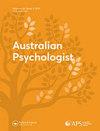Postgraduate students’ perceptions of simulation-based learning in professional psychology training
IF 2
4区 心理学
Q2 PSYCHOLOGY, MULTIDISCIPLINARY
引用次数: 1
Abstract
ABSTRACT Objective In a field with limited placement resources, further exacerbated by challenges due to COVID-19, simulation-based learning (SBL) represents a novel, evidence-based way to expose psychology students to learning opportunities. We examine students’ experiences and perceptions of SBL during postgraduate psychology training and their views on using extended SBL to aid clinical competence development. Methods 84 students in postgraduate training programs from across Australia completed a methods cross-sectional survey about SBL. Quantitative data were analysed using descriptive statistics, while responses to open-ended questions were examined using content analysis. Results The most common forms of SBL were role play, simulated initial interviews and psychological assessments. Students viewed SBL as a valid way to develop assessment and intervention skills and recognised it as a useful means to develop clinical competence. SBL was seen as a good way to ease into client work and incorporating more SBL into professional psychology was viewed as beneficial. From qualitative data, two superordinate themes were generated: SBL May Confer Many Benefits for Professional Training and SBL is Complex and Not Without Challenges. Conclusions Provisional psychologists see value in SBL and appear largely supportive of increasing SBL in professional training. However, educators must be clear on why and how SBL will be used and seek to follow best-practice guidelines.研究生对心理学专业训练中模拟学习的认知
我们调查了学生在研究生心理学训练期间对SBL的体验和看法,以及他们对使用扩展SBL来帮助临床能力发展的看法。方法对来自澳大利亚各地的84名研究生进行方法横断面调查。定量数据使用描述性统计进行分析,而对开放式问题的回答使用内容分析进行检查。结果SBL最常见的形式是角色扮演、模拟初次访谈和心理评估。学生认为SBL是发展评估和干预技能的有效途径,并认为它是发展临床能力的有用手段。SBL被认为是一种很好的方式来缓解客户工作,并将更多的SBL纳入专业心理学被认为是有益的。从定性数据中,产生了两个上级主题:SBL可能给专业培训带来许多好处和SBL是复杂的,并不是没有挑战。结论临时心理学家看到了SBL的价值,并在很大程度上支持在专业培训中增加SBL。然而,教育工作者必须清楚为什么以及如何使用SBL,并寻求遵循最佳实践指南。
本文章由计算机程序翻译,如有差异,请以英文原文为准。
求助全文
约1分钟内获得全文
求助全文
来源期刊

Australian Psychologist
PSYCHOLOGY, MULTIDISCIPLINARY-
CiteScore
3.70
自引率
5.30%
发文量
32
期刊介绍:
The Australian Psychologist is the official applied practice and public policy journal of the Australian Psychological Society. As such, the journal solicits articles covering current issues in psychology, the science and practice of psychology, and psychology"s contribution to public policy, with particular emphasis on the Australian context. Periodically, Australian Psychological Society documents, including but not limited to, position papers, reports of the Society, ethics information, surveys of the membership, announcements, and selected award addresses may appear in the journal.
 求助内容:
求助内容: 应助结果提醒方式:
应助结果提醒方式:


